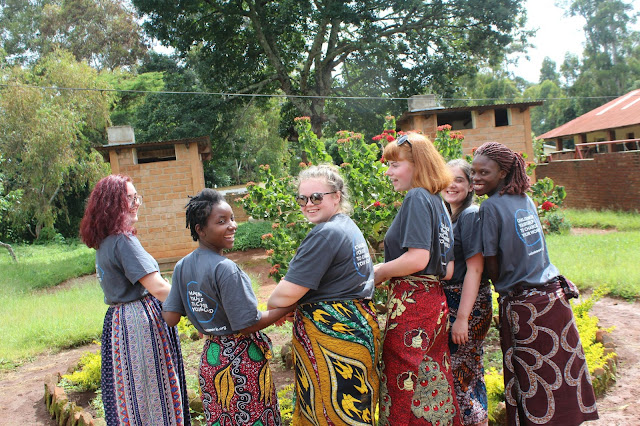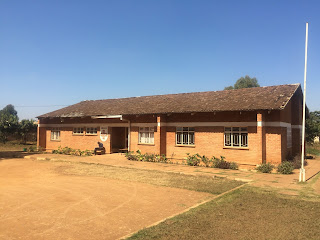Our cohort - Team S.H.E (Sexual Health Empowerment) - arrived in February, and are working with CYECE in Dedza. Our project concerns sexual & reproductive health rights, as well as empowering girls and women.
We started the project with two team leaders, Asher and Comfort, however Comfort left to pursue a job in Zomba. Our new team leader is a previous volunteer, Jack, from Lilongwe.
 |
| Jack and Asher on Dedza mountain |
Asher is a postgraduate student from Yorkshire; he has decided to suspend his studies in Peace and Global Development to have this experience working in the development field. In accompaniment to his studies, Asher has done a lot of youth work and community work in the UK and abroad. This has included sports coaching, educational projects and campaigns for social justice. His hobbies include reading, writing and photography. His ideal career after graduating will be working in a job which involved documenting, written journalism and helping others, preferably for an INGO. For Asher, his placement as a Team Leader is an opportunity to help marginalised communities, contextualise his studies and practice the art of documenting through film photography, writing and listening to others.
Becca is a UKV on a gap year after finishing A-levels in Religious Studies and Business Studies. She is a loud character sometimes, who loves trying new things and travelling. This project is exciting to her as she is passionate about gender rights and women’s empowerment. One thing she wish she had brought is a hairbrush, as it’s notoriously hard to find one in the Malawian market shops compared to the excess of Crocs.
Sam is another of the UKV's, also taking a gap year before going to study mathematics at university. He wanted to do something more meaningful than a generic South East Asian backpacking trip. Sam is nervous regarding his lack of background knowledge regarding the work, however he is more so excited by the opportunity to learn. He is also very interested in linguistics and is excelling at the local language; Chichewa. His communication with the host family is regularly accompanied by them laughing at his mispronunciations and accent, however they are enjoying his tenacity to learn!
Emily is a UKV from Leeds and has previously studied History. Her first graduate job was in finance. Since, she has sought a career change which led her towards apply for an ICS placement.
Emily is happy with life in Dedza, and accounts this to the warm welcome of her host family. She has bonded with them over learning about how to cook; the Malawian way, which prescribes a portion size larger than which we are familiarised with in the UK! She is aiming to build her confidence, and develop her leadership approach which she can use in a better suited career for herself after the placement.
Honor is a UKV from Saltburn, in North East England. Like many other volunteers in the team, she has chosen to undertake this placement during a year out. In September, she will begin studying Politics at London School of Economics. With previous experience in UK Politics, community-based volunteering and campaigning, Honor hopes that she will be able to learn more about global affairs, and a human-rights based approach to development. Her initial thoughts of Malawi and the first few weeks here have been varied; there are fewer cultural differences than expected, however, many aspects of life, such as the food, have still come as a shock to her.
Sungani is an ICV and has a degree in Journalism from the Malawi Institute. She has worked for Love FM Radio station as a reporter and presenter from January 2017, until she applied for ICS. She is excited to build a strong inter-cultural team, and expects that together we can contribute to tackling the challenges that the communities are facing. Sungani is excited to develop the knowledge about the communities and cultures involved in the project.
 |
| Selina, Loyce, Becca and Asher |
Loyce is an ICV from Blantyre. She studied medical laboratory sciences at University and is a mother to 2 young children. She accredits her love for working with children from being a mother. By the end of the volunteer ICS programme, she is hoping to have more knowledge on SRHR and the capacity to demonstrate to others how to be a positive active citizen.
Maximo is one of our ICV’s, born in Blantyre but raised in Lilongwe. He has a degree in Accountancy from a university in Lilongwe. Maximo is fluent in English due to his father studying in the UK, which comes in useful in translating for the UKV’s. From the first day, he realised that as young citizens we are one in the same; we listen to the same music, like similar food and all sleep pretty late. One thing is clear though and that is the fact we all want to help in the development of Malawi. Hopefully through the program we can work towards achieving the common goal.
Selina is a UKV with a degree in Social Work. Before starting the project, she was working in a retail outlet and also doing some volunteering with children. Africa is a place in which she has wanted to see since she was a little child, and she has now realised that it is different to the way it is shown on the media. She enjoys the cooler weather in Dedza and still managed to get an amazing tan! Selina has had a few phobias to overcome in the past week such as the state of the toilets and the amount of cockroaches. One main thing Selina would like to gain from this experience is to be able to familiarise herself with people from different walks of life.
Edward is an ICV, and has just finished an advanced diploma in ICT and is a freelancing computer technician. He joined the ICS Volunteer project as a chance to reach out to communities who don’t know about the importance of SRHR and at the same time building a portfolio for the job market. As a tech personnel working in the tech industry he believes awareness on health related issues together with technology education will secure Malawian youth against sexual transmitted diseases and joblessness.
Scarlette is a UKV and has just finished studying psychology, geography and English last year. She decided to apply for ICS to further her knowledge and understand the challenges faced by people in other countries, on a first person basis. After this, she hopes to pursue a career in human rights after attending university to do a human rights law degree. At the moment, she is struggling to fit into the Malawian way of life as the food is very different to her vegetarian diet. She wishes she brought more sun cream as well as British tea bags! However she is keeping an open mind on how the next 3 months can go.
Follow @cyece.dedza on Instagram for more updates!
 |
| Asher, Sam, Maxi and Scarlette facilitating an anti-bullying session |







